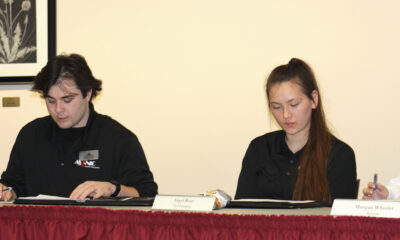A can of chips for lunch. Late night drinking binges. The “freshman 15.” The lifestyle of the college student is less than healthy and, in some cases, is harmful. But do college students really understand the consequences of this lifestyle? Too often, the answer is no.
Lynne Kinson, health and wellness coach, argued a different approach to eating in her lecture “Eat Right – Be Well” presented September 19 in the Student Union Building. For her hour-long class, Kinson answered the questions of why students are tired all the time, why putting on weight gets rather easy in older age and the measures everyone should take to have a better life.
“When you eat dinner, do you think ‘What am I eating to prevent cancer? What about osteoporosis?’” asked Kinson “We need to eat to improve our heath.”
Kinson explained the motivation behind many people’s eating habits.
“Why am I eating? People eat when they get home because they’re starving,” Kinson said. “Maybe they forgot to pack a lunch. The trick is… don’t let yourself get to that starved point.”
Why not eat one big meal once a day? Kinson explained that the body can’t process a large meal as efficiently, especially in a high-stress lifestyle. Instead, she said to eat five to six small meals a day that are filled with high quality foods and protein.
“If I skip breakfast, I can save those calories up for night. Does this work?” Kinson smiled and the audience laughed. “No. This never works.”
Another tip Kinson suggested is to eat nutrient-rich food that’s actually valuable to your body. The audience threw out examples of this type of food, such as spinach, whole grains, milk, yogurt, and fish.
Fitting good fats into the diet is also important. In fact, these fats are what help the body feel satisfied after a meal. So instead of cutting out fat altogether. Kinson said to add foods such as olive and coconut oil to dinner.
“Research is showing that eliminating fat from your diet actually causes weight gain,” said Kinson. “It’s good to include some good fats in your meals.”
She said not to be afraid to take supplements to boost your nutrient intake, either.
“I am a strong believer in supplements,” Kinson said. “We just don’t have the food quality that we used to.”
But knowing how to eat healthily is not enough to start a real lifestyle change, she said. During the lecture, Kinson explained how everyone will need something to motivate change.
“You need to do a self-check to see what’s important,” Kinson said.
Finding a reason to change doesn’t have to be a deep or highly moving experience, either. Johanna Gerger, 20, gave her reasons for eating better.
“Overall, I think I eat somewhat healthier because of the P.E. class I took last semester,” said Gerger. “She (the P.E. instructor) was big on teaching us how to eat healthy balanced meals. But there are those days where fast food is easier.”











